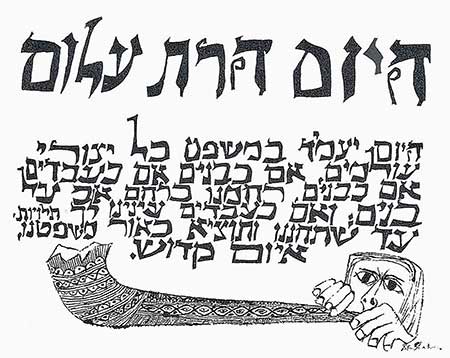Pride, Humility and Compassion

For Jews who do not live within the “four cubits” of the Halakhah[1], the High Holidays are an opportunity to bring family members together, dust out a few traditional culinary recipes, and contact friends to wish them well. However, Rosh ha-Shanah and Yom Kippur didn’t enter Jewish tradition for such purposes important as they may be.
Typically, Israeli Jews, for instance, end a discussion with the proverbial מה יהיה (mah ihiyeh) literally: “What will it be?”[2]
Invariably answering: יהיה טוב (ihiye tov) “It will be OK.”
This is because Jews believe that the future is not what it will be but that which it should be.
This is the drive behind the extraordinary history of Jewish contributions to medicine, science, technology, economy, agriculture, literature, and spirituality (should we now add also “military prowess”?).
Nothing is farther from Jewish thought than a naïve assumption that everything will take care of itself. Judaism breathes confidence that if they so will it, Jews can meet almost all challenges they face.
The display of impressive military intelligence, planning, discipline, and professionalism deployed by the Israeli defense establishment in facing the murderous designs of Iran, Hizbullah, Hamas, Houthis, and the Islamic Resistance in Iraq (IRI) is today one of the clearest examples of Jewish thinking.
Those who wish to destroy Israel should have understood by now that the future of the Jewish State is unassailable from the outside.
The Jewish accomplishments for the betterment of humanity and the ongoing defense of the Jewish state are unarguably reasons to celebrate and feel pride. These accomplishments explain the Jew’s optimism, adventurousness, and self-assurance.
Pride, however, is a double-sided sword. It easily metamorphoses into arrogance; it clouds the mind and distorts perceptions.
The future existence of the State of Israel and the Jewish people is not in the hands of those who have converted envy and jealousy into hate. The existential danger comes from Jews who have lost sight of the reason for their existence on the presumption that they know better.
The High Holidays express the Jewish people’s concern for the future.
Rosh Hashanah states that on this day, the world was created.
The power of this message is in its corollary: Humans were put on earth to become stewards of health, peace, and prosperity.
“What the Jewish state has done in the past year—for its defense, but in the process and not coincidentally for the security of all of us—will rank among the most important contributions to the defense of Western civilization in the past three-quarters of a century,” wrote Gerard Baker, editor at large at the “Wall Street Journal.” He explained:
“Israel has, in 12 months, done nothing less than redraw the balance of global security, not just in the region, but in the wider world.
It has eliminated thousands of the terrorists whose commitment to a savage theocratic ideology has claimed so many lives across the region and the world for decades. It has, with extraordinary tactical accuracy, dispatched some of the masterminds of the worst evil on the planet… It has repelled and then reversed the previously inexorably advancing power of one of the world’s most terrifying autocracies, the Islamic Republic of Iran.”
He ended his post by echoing the words of praise of Winston Churchill to the fighters of the Royal Air Force after they had repelled Hitler’s Luftwaffe during the Battle of Britain:
“Never in the field of human conflict has so much been owed by so many to so few.”
The High Holidays convey the message that the world’s future will be good, provided we assume our stewardship of the world; they also carry a cautionary message.
While we should hold our heads high as a consequence of what Israel is doing for the world, we should also fill our hearts and minds with compassion and humility, not with arrogance.
In 1969, when asked about the war with Egypt, then-Israeli Prime Minister Golda Meir said at a news conference in London.
“When peace comes, we will perhaps in time be able to forgive the Arabs for killing our sons, but it will be harder for us to forgive them for having forced us to kill their sons. Peace will come when the Arabs will love their children more than they hate us.”
These Yamim Noraim (High Holy Days), we have much to be proud of Jewish achievements. In conveying this message, particularly to our children, we should tell them, however, that Jews do not define themselves solely by their accomplishments but also by their humility, compassion, and mutual respect.
שנה טובה
Rabbi Moshe Pitchon
[1] The code of Rabbinic Jewish law, dating back to the Middle Ages
[2] Not it the sense of what are you having,” but in the sense of “what will happen?”

